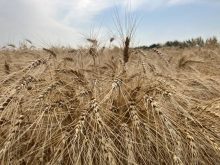Checkoff dollars paid on Prairie wheat and Saskatchewan and Manitoba barley will be 82 and 85 per cent eligible respectively toward federal research tax credits for 2007, the Western Grains Research Foundation announced Monday.
Wheat growers in all three Prairie provinces can claim 82 per cent of their checkoff payment toward a tax credit at a rate of 20 per cent (35 per cent for corporations).
For example, a grower who paid $300 in wheat checkoffs in 2007 could claim $246, or 82 per cent, on his or her tax form. The credit would be 20 per cent of that amount, or $49.20. A farm filing as a Canadian-controlled private corporation would earn $86.10 (35 per cent of $246).
Read Also

Pea, lentil outlooks have some positive signals – Penner
As pulse growers consider what to plant this spring, Chuck Penner of Leftfield Commodities Research said there is some optimism in the Canadian pulse market. Penner gave a presentation at the Saskatchewan Pulse Growers meeting in Swift Current on Feb. 4.
Similarly, Saskatchewan and Manitoba barley growers who paid barley checkoffs to the WGRF could get credit for 20 (or 35) per cent of 85 per cent of the checkoffs paid.
Alberta’s barley growers pay their checkoff to the Alberta Barley Commission. According to the WGRF, the Alberta barley checkoff is 39 per cent eligible. (Thus an individual Alberta barley grower paying $300 in barley checkoffs in 2007 would be eligible for a $23.40 tax credit, compared to $51 through the WGRF for a similar farmer in Manitoba or Saskatchewan.)
The WGRF’s unofficial review of other crop checkoffs’ 2007 eligibility included 19.95 per cent for Alberta canola, 17 per cent for Alberta pulses, 23.087 per cent for Manitoba canola, 22.8 per cent for Manitoba pulses, 40 per cent for Saskatchewan pulses and 13 per cent for Saskatchewan flax.
The allowable percentages under the federal scientific research and experimental development (SRED) tax credit are based on the percentage of checkoff dollars directed to research work at accredited labs, such as universities or government facilities.
“The WGRF and other commodity groups worked hard to have government recognize the significant investment from farmers into (research and development) and make this tax credit available,” WGRF executive director Lanette Kuchenski said in a press release Monday.
“Hopefully farmers use this opportunity and talk to their accountants about the advantages it holds for them.”
The WGRF also collects research revenue from Canada’s two main railways, charged to them by the federal government in years when both or either exceed their allowable revenue cap for handling Prairie grain.














